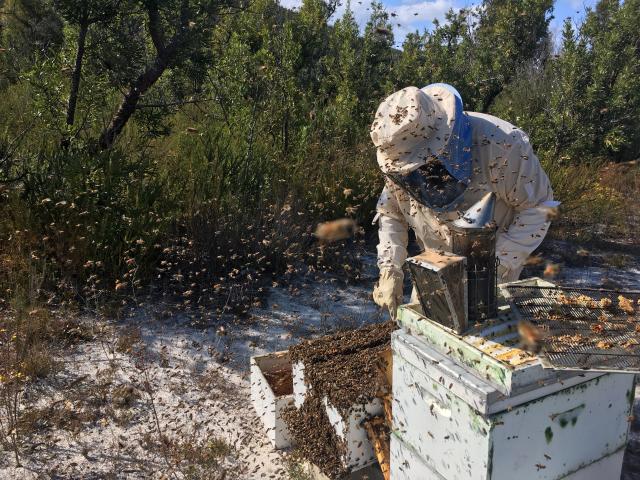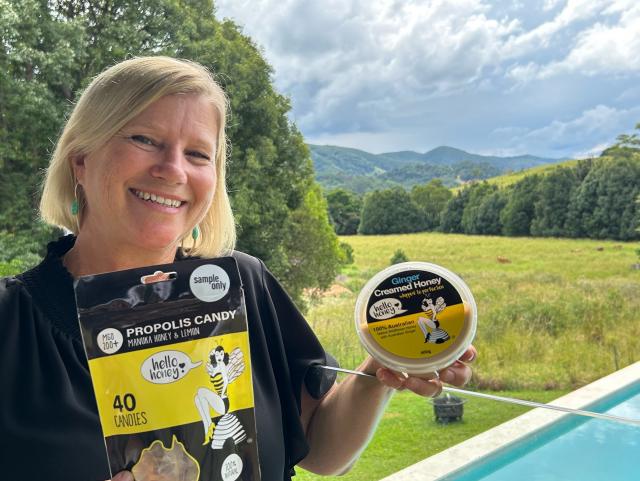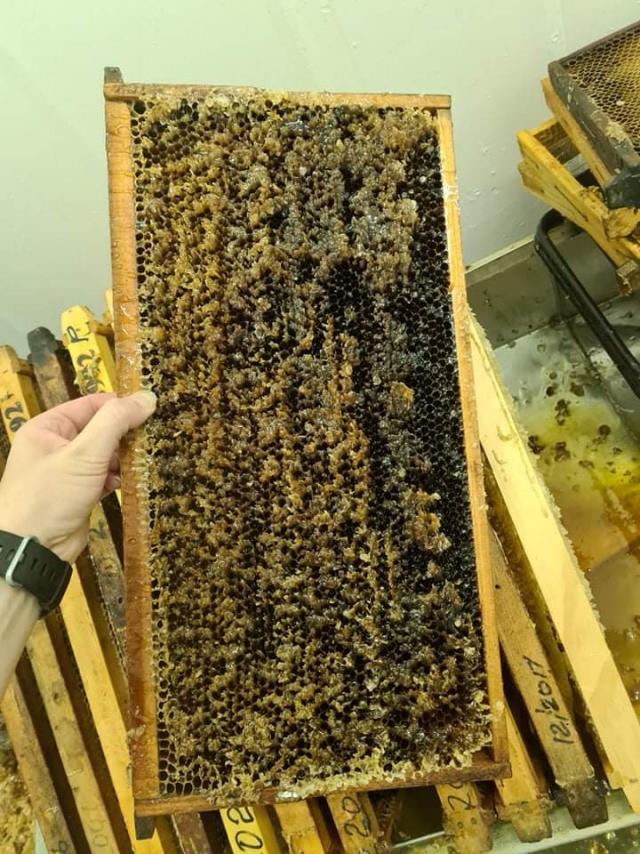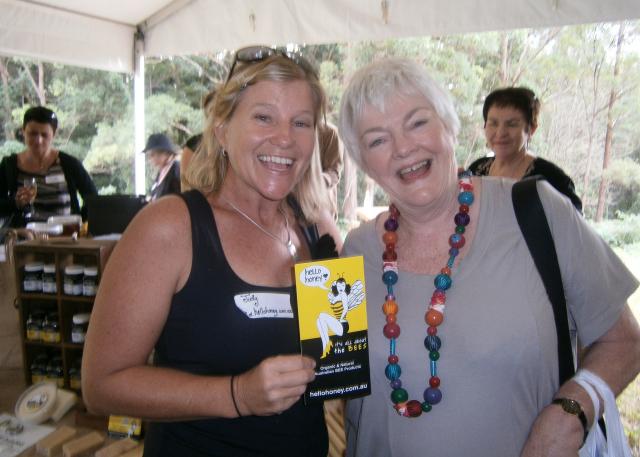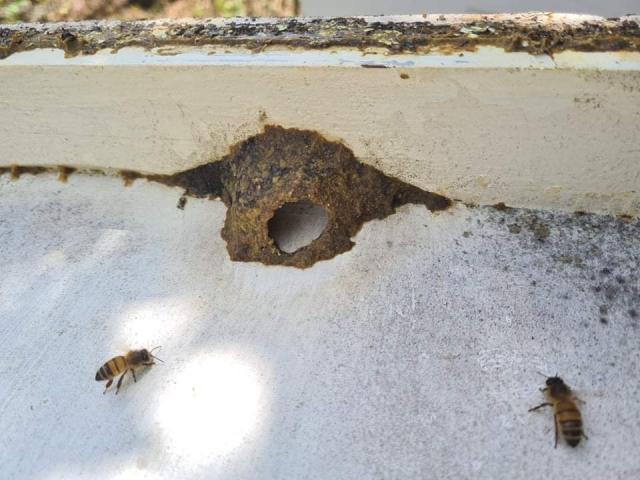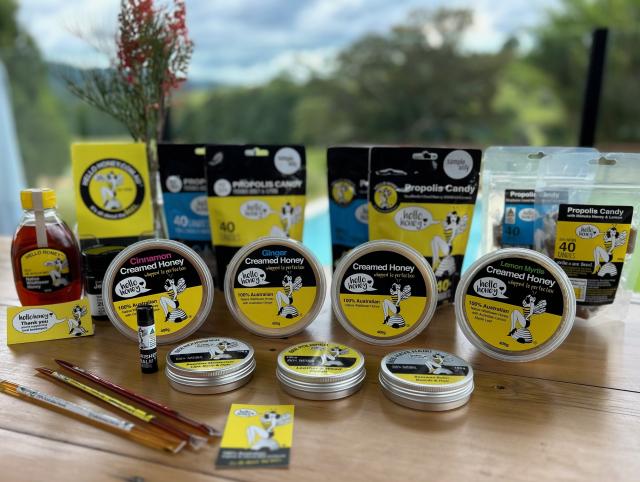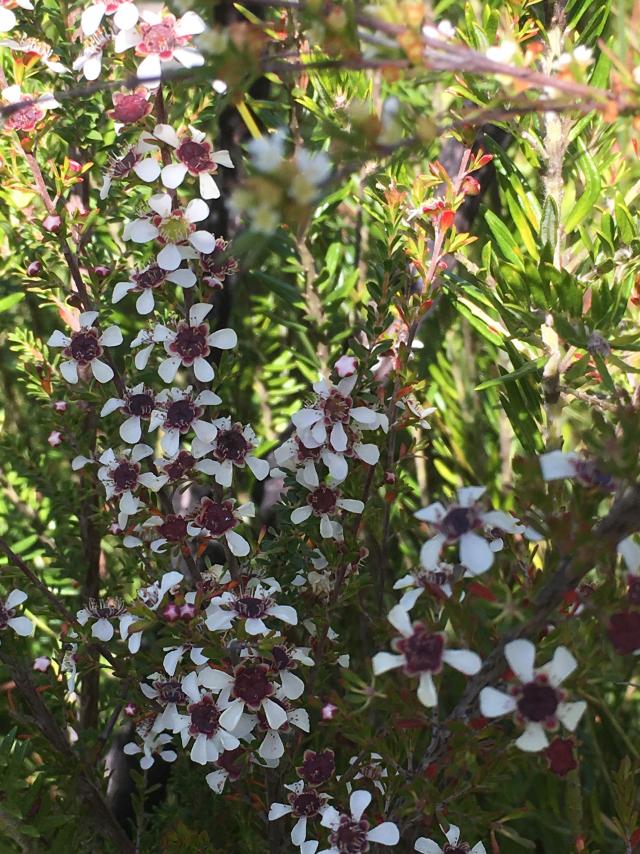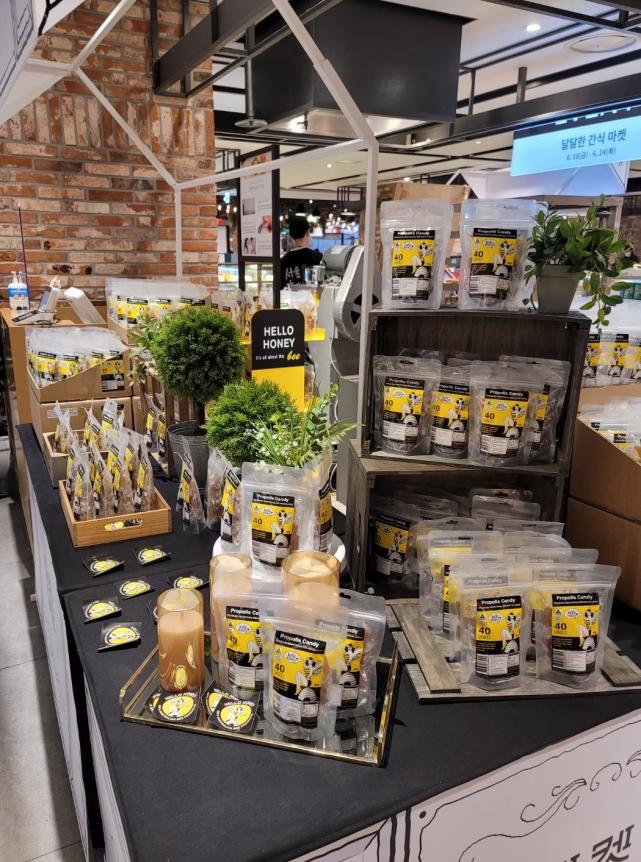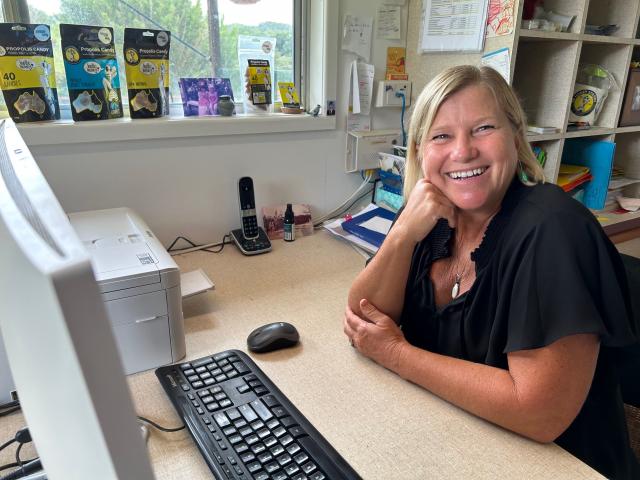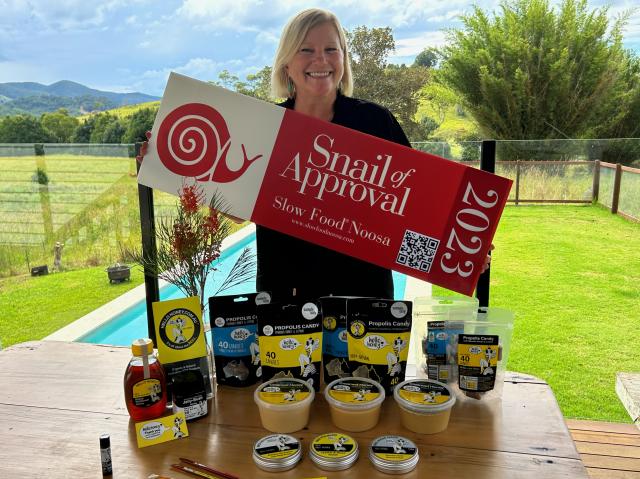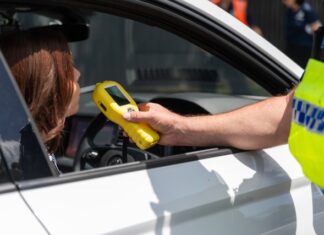PRECEDE
Respect, fairness, and supporting local producers are the trademarks of Judy Scrase and her Hello Honey label. ERLE LEVEY takes a look at the little Aussie brand that’s developing international markets.
BREAKOUTQUOTE
“We only source honey from beehives placed amongst our native Australian wildflowers, not from hives used for pollination on sprayed crops. Our customers can also be happy in knowing that our Hello Honey products are supporting Australian beekeepers and Australian businesses.’’
Quality and trust … Judy Scrase has gone from a solo operation at farmers markets to a business that is set to export to Japan and Korea by building on these attributes.
Honesty and integrity can get you a long way in business … yet you also need to trust your instincts and be prepared to spend a lot of time and effort in making an idea successful.
That’s Judy Scrase’s journey with her Hello Honey range of nourishing honey and bee products.
What started as a solo operation at farmers markets at Noosa and the Sunshine Coast hinterland has turned into a business that is set to trade internationally in Japan and South Korea.
Even Judy’s love affair with honey started by accident – literally.
Heating cooking oil in a baking dish, ready to make a roast dinner for her husband Brendan, became a life-changing moment.
Brendan helped by pulling the tray out and in doing so spilled the oil down his forearm.
The effect was immediate. The skin started to blister and Brendan called for the honey.
At the time he was working at the Kabi Organic Golf Course and Orchard in the Noosa hinterland – the first organic golf course in the Southern Hemisphere.
His role included collecting honey from the bee hives he had developed.
Now, with boiling oil on his arms, Judy was stunned as he slathered the honey onto his skin and bandaged it.
No gauze, just a bandage.
Judy warned that by doing so, removing the bandage would tear any scab off that had formed during the healing process.
Yet Brendan persisted.
You can imagine Judy’s shock when a day or two later he peeled the bandages off to reveal a thin layer of new dry film of skin already forming.
To this day you cannot see any scarring.
“I was gobsmacked,’’ Judy said. “It was that moment when you think, I’m going to do this.
“We had been to New Zealand for our honeymoon and had seen it everywhere – manuka honey and propolis candy.’’
“When I saw that with Brendan’s arm, I thought we need to do this – Australia needs to use its own honey.’’
Propolis is a substance created by the bees from tree/plant bud resin, pollen and beeswax. It protects their hive, but has been found to have strong antibiotic and healing properties.
It has been adapted to help soothe a sore throat.
Judy is telling me about her journey while enjoying a cup of tea – with honey – at their home at Kin Kin in the Noosa hinterland.
It was home to Lionel and Gwen Hempsall for many years, as owners and operators of their sawmill a couple of doors down the hill.
Her office in the northern wing of the house is the same one Lionel used.
The house is post war and built from timber milled by the Hempsall business.
“We only source honey from beehives placed amongst our native Australian wildflowers,’’ Judy said, “not from hives used for pollination on sprayed crops.
“Our customers can also be happy in knowing that our Hello Honey products are supporting Australian beekeepers and Australian businesses.’’
Judy comes from a family involved in the food industry – her father Peter Van Leeuwen was a baker in the Netherlands before coming to Australia in the early 1960s.
His father was a baker before him and Peter ran Bakkerij van Leeuwen close to Amsterdam’s Schiphol Airport.
Having been born in Brisbane, Judy grew up in Zillmere as the youngest in the family with two brothers and two sisters.
“That’s where my cinnamon creamed honey came from,’’ Judy said, “… from the Dutch spices.
“It pays homage to him.
“My mother is still living in the house she’s been in for 60 years
“She’s a Brisbane girl. They met at the Cloudland dances, like so many people did back then.
“Half of my family live on Stradbroke Island, which is my connection with the beautiful honey that comes from there.
“I’ve been working with the beekeepers, who have been there forever.’’
It’s that building of trust that is at the core of Judy’s business. And that is such an important keystone of doing business in Asia.
Trade Investment Qld has just presented Judy’s new Drop Shaped Propolis Candy at the Japan Foodex Tradeshow and Hello Honey has been accepted by Austrade to be part of the Korean Trade Show in Seoul in late May.
To be held at Kintex – Korea International Exhibition Center – it will be for Food, Beverages, Hospitality, Food Industry, Bakery and Supermarkets.
As well as the propolis candy, Judy will be taking her range of products that includes creamed honey, a range of moisturisers, beeswax polish, a beard balm and lip balm.
This area from Yandina and Tewantin through to Tin Can Bay and Maryborough is supposed to be exceptional for the manuka-style honey that comes from the blossoms on the native vegetation.
Judy also uses the blossoms from the jelly bush as they tend to be very reliable, especially in dry weather.
“The difference between me and others is I specialise in sourcing honey from native flowers, not from crops and orchards that may have been sprayed .
“I’ve also worked with local beekeepers as well as Pomona and Yandina.
“Some have been doing it for a long time but there’s been a resurgence with young beekeepers.
“Stradbroke provides amazing honey. It’s pristine conditions there.’’
Judy started her business with six jars of honey from Stradbroke Island, initially using their label and then asked if it was okay to use her own brand.
It was medicinal honey and the words Hello Honey was what Judy was always greeted with when she got home.
Not only was it a term of endearment but an introduction.
Judy’s husband Brendan grew up at Phillip Island where his father Dave managed the internationally-known Penguin Parade and Environment Park for many years.
Brendan worked at the Phillip Island Race Track and the honey story probably goes back to the way he was always dealing with people.
Coming to Queensland to go surfing, he worked at Super Bee tourism complex and honey farm at Tanawha.
Brendan took the honey from the hives but the live bee shows saw him educate visitors about the importance of these tiny creatures and enabled him to share mysterious secrets from within the beehive.
Judy met Brendan at a barbecue at Noosa River. She was working with imported jewellery and homewares, which meant buying around the world.
Prior to that she worked for Polygram records in Brisbane, which is now Universal.
“We were talking about what we do when Brendan said that by then he was working at Kabi Golf Course.
“He was very passionate about it and has worked there for 20 years.
“The golf course had a food-producing capability with orchards and gardens growing between the fairways.
“So he would cross-pollinate those crops and started a hive. Eventually he would bring some honey home.
“We had been living at Cootharaba but ended up moving closer to Kin Kin.
“While we were at Cootharaba we lived off grid. We had solar, and a generator to wash the clothes.
“It would sometimes have a snake on it, which made things adventurous to say the least … especially when you have a baby on your hip.’’
One of the benefits was that the owner had left all of her books there for Judy and Brendan to read.
The books were about permaculture and organic farming, which warned of the affects of pesticides.
“I wanted to work from home so we started doing the Noosa Farmers Market, the Real Food Festival at Maleny, and the early days of the Curated Plate at Maroochydore before Covid arrived.
“People appreciated that my range of products was local and I started on-line sales but had to apply to the government for a subsidy so that I could get satellite Internet.
“As you can imagine, it was really slow dial-up and infrequent coverage.
“The funny thing was if I had to take an Efpost order I would have to tell them to just wait while I drove up the hill, stood on top of the car and then waited three and a half seconds for it to register. You could tell by the beep.’’
Finally the decision was made to move to Kin Kin because the local school had a tiny kitchen garden and they wanted their two boys to learn there.
It was just a little sensory garden at that stage with flowers and herbs.
“I thought that’s the type of school I would like my children to grow up in. So we bought Lionel and Gwendolyn‘s home and the kids could walk to school every morning, which is a really nice thing to do.
“We were quite involved with the school and we’ve got a lovely little village here.
“The beauty of the school is they also got awarded the Stephanie Alexander Kitchen Garden program so they learnt to grow food, how to weed, and how to harvest.
“They had a kitchen purpose-built, so they could cook the produce that they grew.
“Only 15 schools received the grant for her project. I was so pleased to tell her about my children’s experiences since her program has been in place at Kin Kin.
After moving to Kin Kin, Judy and Brendan stopped collecting honey at Kabi Golf Course and relied on the local beekeepers.
“They are really friendly people,’’ Judy said. “They are really good people.
“I’ve sold all types of honey at the markets. It would take about 10 minutes to get through the taste testing of five or six types.
“That would be seasonal bush honey … they change with the weather.
“Every time they harvest it’s different. There’s are so many variables in that final product depending on how much rain we’ve had, what’s been blooming.’’
After the shock to business of Covid, Hello Honey is starting to take off again, Judy said.
There is a new label and it’s being sold everywhere in Australia except for Western Australia, as it is not allowed to be imported there.
Judy even has some international sales.
Yet after 10 years she was facing burnout from markets and selling on-line.
“It was hard to find time to yourself so I worked at Living Valley wellness retreat here at Kin Kin for a while.
“I didn’t realise how much I had missed being in an environment with other people.
“Then I got this call from a gentleman who had noticed my honey straws – that’s 10 grams of honey I give out to children.
“This gentleman said he wanted to send some honey to South Korea.
“I told him about the propolis candies that were for a sore throat. He tried them and was impressed.
“At the time I had creamed honey, a range of moisturisers, beeswax polish, a beard balm and a lip balm.
“He thought that sounded good and his orders got bigger and bigger.
“That was about six years ago. He was sending it to Korea and it was being sold there.
“Everyone knew manuka honey but I wanted to use 100 percent Australian product.
“The Stradbroke honey is tested at University of the Sunshine Coast.
“Eventually he wanted to export a full container for the major department stores in Seoul.’’
That’s when Covid arrived and Australia was locked down, the department stores stopped trading and then everyone went back to on-line shopping.
Lessons learned are that you’ve got to support local, Judy said.
“That’s what I love about doing what I’m doing. It’s based on what they do in German villages where people have quality product and they deal with the local community.
“It’s a guarantee of continued supply and quality.
“I want to be able to run a business where we use local printers, beekeepers, and packaging supplies between here and Brisbane.
“So even though I’m only one person, I am keeping quite a few people employed.’’
Investing in her own backyard is why Judy was nominated for Slow Food which has a philosophy of food that is good, clean, and fair for all.
It’s also why she has been a finalist in the Sunshine Coast Business Awards.
While Covid initially interrupted the export market for Hello Honey, the propolis candy sore throat lozenge saw sales increase dramatically.
“People in Korea understood propolis.
“I didn’t get one payment from the government as a subsidy to keep the business going through Covid.
“When the borders opened internationally and domestically, production just dropped off because if one person is sick you cannot continue as a food producing facility.
“So many businesses were just treading water to stay afloat. We managed to get a few orders but nothing like the year before.
“I took up some support work to help with income until we got back to the levels we were at.
“The saving grace was it couldn’t have come at a better time. Trade Investment Queensland invited me to present my product at the Japan Foodex Trade Show in February.
“That was pretty exciting and people have contacted me as a result of that.’’
The new packaging of the propolis candy has a clear map of Australia so that customers can see the candies inside. And they have been made into a drop shape instead of a log, to make them easier to eat.
Still keeping things local, Judy’s graphic artist is her childhood friend who now lives in Pomona.
“She has helped me since I’ve started professionally packaging my produce.
“I’ve always put money back into the business so Hello Honey is now a trademark brand in Australia and just a matter of weeks ago in South Korea as well.
“Since the GFC I’ve been trying new products then streamlining it down. The creamed honey range came from enjoying it when we were kids.
“I decided to use native Australian bush foods – such as crushed lemon myrtle leaf, and ginger creamed honey which comes from Bundaberg because of the finely ground ginger that can be suspended evenly.’’
For that, she attributes people such as Del Chapman for giving her the inspiration and knowledge needed.
Del is among a number of people who have helped her along the journey.
Going to Seoul at the end of May will see Judy take her full range of products in order to put a face to the name and the brand.
Respect is part and parcel of the way you do business in Japan and Korea, and you have to earn that.
Judy used to work in Japan when she was younger – at a golf and ski resort on Hokkaido.
“I learnt about being respectful at all times, especially to elders,’’ Judy said. “If anything I learnt the value of being honest and having integrity – I have learnt a lot.
“I’m so excited about going to Kintex – it is the biggest food show in Korea so I’ll be dealing with people from some amazing companies.
“I’ve requested a hotel room with windows because I love to look out and to have fresh air.
“Covid reminded us of values.
“Working from my home office had become normal for me. The business is built on trust and the ability to gather natural and wholesome produce.
“That way I’m able to distribute through a string of local retailers – from the Ginger Factory at Yandina to Aussie World at Palmview and to the Black Ant Gourmet here in Kin Kin.
“Everything is as natural as possible. I bring it under a trusted brand and I pay fair price, I don’t cheapen the value.
“We need to value that – and the people who provide this produce.’’
Judy’s story is inspiring in so many ways, but perhaps the greatest takeaways are her determination in supporting local, and her pride in operating with integrity. Simple really.

